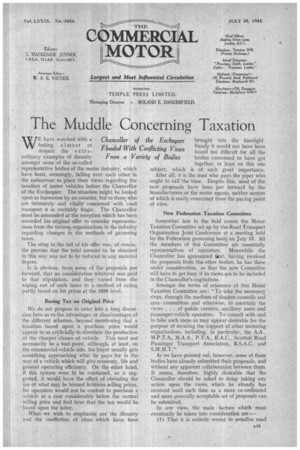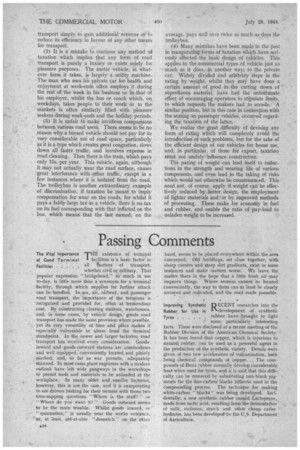The Muddle Concerning Taxation
Page 17

Page 18

If you've noticed an error in this article please click here to report it so we can fix it.
Chancellor of the Exchequer Flooded With Conflicting Views From a Variety of Bodies
WE have watched with a feeling almost of despair the extraordinary examples of disunity amongst some Of the so-called , representdtive bodies of the motor industry, which have been, seemingly, falling over each other in the endeavour to place their views regarding the taxation of motor vehicles before the Chancellor of the Exchequer. The situation might be looked upon as humorous by an outsider, but to those who am intimately and vitally concerned with road transport it is veritably tragic. The Chancellor must be astounded at the reception which has been accorded his original offer to consider representations from the various organizations in the industry regarding changes in the methods of garnering taxes.
The sting in the tail of his offer was, of course, the proviso that the total amount to be obtained in this way was not to be reduced to any material degree.
It is obvious, from some of the proposals put forward, that no consideration whatever was paid tcr that stipulation, and they varied from the wiping out of ' such taxes to a method of rating partly based on list prices at the 1938 level.
' Basing Tax on Original Price We do not propose to enter into a long discussion here as to the advantages or disadvantages of the different schemes, beyond mentioning that a taxation based upon a purchase price would appear to us artificially to stimulate the production of the cheaper 'classes of vehicle. This need not necessarily be a bad.point, although, at least, on the commercial-vehicle side. the bUyer usually gets something approaching 'what he pays for in the way of a vehicle which will give economy, life and general operating efficiency. On the other hand, if this system were ti) be continued, as is suggested, it would have the effect of obviating the use of what may be termed fictitious selling prices, for operators would not be content to purchase a vehicle at a cost considerably below the normal selling price and find later that the tax would be 'based upon the latter.
What we wish to emphasize are the disunity and the confliction of ideas which have been brought into the limelight. Surely it would not have been found too difficult for all the bodies concerned to have got together, at least on this one subject, which ' is of such great importance.
After all, it is the man who pays the piper who ought to call the tune. Despite this, most of the new proposals have been put forward by the Manufacturers or the motor agents, neither section of which is really concerned from the paying point of view.
New Federation Taxation Committee Somewhat late in the field comes the Motor Taxation Committee set up by the-Road Transport Organization Joint Conference at a meeting held by the Federation governing body on July 13. All the members of this committee are essentially representatives of operators. Meanwhile the Chancellor has ainnounced titat, having received the proposals from the other bodies, he has these under consideration, so that the new Committee will ha've to get busy if its views are to be included in the Chancellor's cogitations.
Amongst the terms of reference of this Motor Taxation Committee are : "To take the necessary steps, through the medium of shadow councils and area, committees and otherwise, to ascertain the views . . . of public carriers, ancillary users and passenger-vehicle operators. To consult with and to take such steps as may appear desirable for the purpose of securing the support of other motoring organizations, including, in particular, the A.A., M.A.A., P.T.A., R.A.C., Scottish Road Passenger Transport Association, R.S.A.C. and S.M M T ."
As we have pointed oui, however, some of these bodies have already submitted their proposals, and Without any apparent collaboration between them. It seems, therefore, highly desirable that the Chancellor should be asked to delay taking any action upon the views which he already has received until such time as a more co-ordinated and more generally acceptable set of proposals can be submitted.
In our view; the main factors which must eventually be taken into consideration are (1) That it is entirely wrong to penalize road transport simply to gain additional revenue or to reduce its efficiency in favour of any other means for transport.
(2) It is a mistake to continue any method of taxation which implies that any form of road transport is purely a luxury or exists solely for pleasure purposes. The motor vehicle, in whatever form it takes, is largely a utility machine. The man who uses his private car for health and enjoyment at week-ends often employs it during the rest of the week in his business or in that of his employer, whilst the bus or coach which, on weekdays, takes people to their work or to the markets is often similarly filled with pleasure seekers during week-ends and the holiday periods.
(3) It is unfair to make invidious comparisons between various road users. There seems to be no reason why a horsed vehicle should not pay for its very considerable use of road space, particularly as it is a type which creates great congestion, slows down all faster traffic, and involves expense in road cleaning. Then there is the tram, which pays only 15s. per year. This vehicle, again, although it may not actually wear the road surface, causes great interference with other traffic, except in a few instances where it is isolated from the road. The trolleybus is another extraordinary example of discrimination, if taxation be meant to imply compensation for wear on the roads, for whilst it pays a fairly large tax as a vehicle, there is no tax on its fuel corresponding with that inflicted on the bus, which means that the last named, on the average, pays well over twice as much as does the trolley-bus.
(4) Many mistakes have been made in the past in inaugurating forms of taxation which have seriously affected the basic design of vehicles. This applies to the commercial types of vehicle just as much as it does, in another way; to the private car. Widely divided and arbitrary steps in the rating by weight, whilst they may have done a certain amount of good in the cutting down of superfluous material, have had the unfortunate effect of encouraging operators to stipulate limits, to which requests the makers had to accede.A similar position, but in this case in connection with the seating on passenger vehicles, occurred regarding the taxation of the latter.
We realize the great difficulty of devising any form of rating which will completely avoid the introduction of such problems, but for the sake of the efficient design of our vehicles for home use, and, in particular, of those for export, taxation must not unduly influence construction.
The paring of weight can lend itself to reductions in the strength and wearing life of various components, and even lead to the taking of risks which would not otherwise be countenanced. This need not, of course, apply if weight can be effectively reduced by better design, the employment of lighter materials and/or by improved methods of processing. These make for economy in fuel and rubber, and enable the ratio of pay-load to unladen weight to be increased.




















































